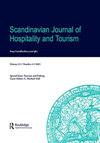行走在一起的谈话方法:在未知的地形中航行
IF 3.6
4区 管理学
Q2 HOSPITALITY, LEISURE, SPORT & TOURISM
Scandinavian Journal of Hospitality and Tourism
Pub Date : 2020-05-15
DOI:10.1080/15022250.2020.1766560
引用次数: 9
摘要
在人类世的黎明,迫切需要找到方法来挑战研究他人和自然的哲学,而不是确定研究的手段。本文探讨了在复杂、动态的自然旅游环境中,随波逐流方法的应用。具体地说,它将注意力重新定向到随大流的方法“言而有信”时所涉及的协作和参与过程。基于来自丹麦最西部和最东部的35个高度多样化的徒步旅行,我们阐明了徒步旅行方法的挑战性维度。向参与者主导的与自然接触方式的内在转变迫使研究人员与他人一起导航,并由他人引导,通过自然、社会性、(非)授权和具体化的字面和比喻的未知领域。作为共同导航和共同学习的努力,go -along不仅仅是走路和说话的总和,因为我们不断地与自我、他人和自然联系在一起。因此,我们把“相处”定义为与他人在未知领域的社交和身体航行。研究结果表明,旅游研究人员仍然需要抓住随大流方法的机会,并提出一种更关心、更强调、更专注的与他人交往的方式,从而使随大流方法蓬勃发展。本文章由计算机程序翻译,如有差异,请以英文原文为准。
To walk the talk of go-along methods: navigating the unknown terrains of being-along
ABSTRACT In the dawn of the Anthropocene, it is imperative to identify methods to challenge philosophies of researching upon others and nature and instead identify means of researching with. This paper explores the use of go-along methods in complex and dynamic nature-based tourism settings. Specifically, it re-orients attention towards the collaborative and participatory processes involved when “walking the talking” of go-along methods. Based on 35 highly diverse go-alongs from the westernmost and easternmost parts of Denmark, we illuminate challenging dimensions of go-along methods. Inherent shifts towards participant led ways of engaging with nature force researchers to navigate with others as led along by others through literal and figurative unknown terrains of nature, sociality, (dis)empowerment and embodiment. Go-alongs as a co-navigating and co-learning endeavor is more than the sum of walking and talking as we continuously relate to self, others and nature. Accordingly, we coin being-along as the social and bodily navigation of unknown terrains with others. Findings suggest tourism researchers are still to seize the opportunities of go-along methods and propose a cultivation of more caring, emphatic and attentive ways of engaging with others on which go-along methods thrive.
求助全文
通过发布文献求助,成功后即可免费获取论文全文。
去求助
来源期刊
CiteScore
7.90
自引率
8.30%
发文量
14
期刊介绍:
Scandinavian Journal of Hospitality and Tourism is the leading Nordic journal for hospitality and tourism research. SJHT aims at initiating and stimulating high-impact and innovative research relevant for academics and practitioners within the hospitality and tourism industries. The journal takes an interdisciplinary approach including, but not limited to geography, psychology, sociology, history, anthropology, and economics. SJHT encourages research based on a variety of methods, including both qualitative and quantitative approaches. The journal covers all types of articles relevant to the Nordic region, as well as the North Atlantic, North Sea and Baltic regions. We also welcome reviews and conceptual articles with a broader geographical scope that clearly enhance the theoretical development of the hospitality and tourism field. In addition to research articles, we welcome research notes and book reviews. Published articles are the result of anonymous reviews by at least two referees chosen by the editors for their specialist knowledge.

 求助内容:
求助内容: 应助结果提醒方式:
应助结果提醒方式:


